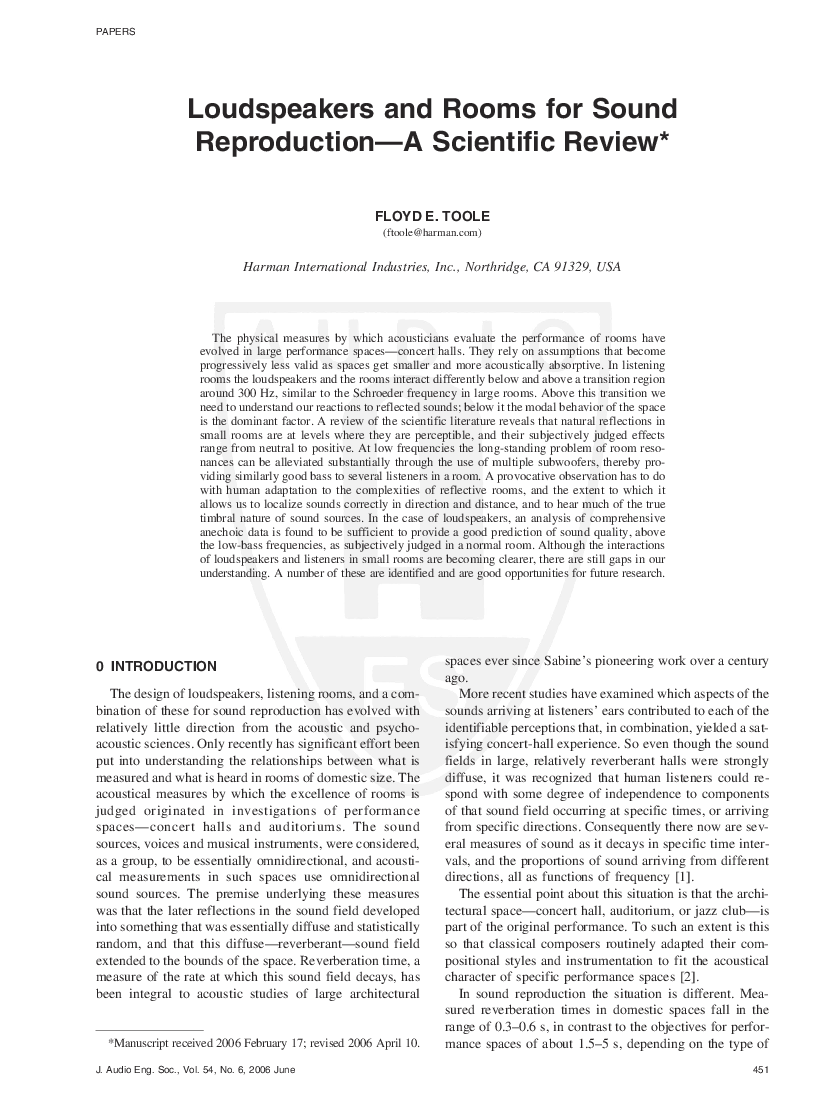Home / Publications / E-library page
You are currently logged in as an
Institutional Subscriber.
If you would like to logout,
please click on the button below.
Home / Publications / E-library page
Only AES members and Institutional Journal Subscribers can download
The physical measures by which acousticians evaluate the performance of rooms have evolved in large performance spaces—concert halls. They rely on assumptions that become progressively less valid as spaces get smaller and more acoustically absorptive. In listening rooms the loudspeakers and the rooms interact differently below and above a transition region around 300 Hz, similar to the Schroeder frequency in large rooms. Above this transition we need to understand our reactions to reflected sounds; below it the modal behavior of the space is the dominant factor. A review of the scientific literature reveals that natural reflections in small rooms are at levels where they are perceptible, and their subjectively judged effects range from neutral to positive. At low frequencies the long-standing problem of room resonances can be alleviated substantially through the use of multiple subwoofers, thereby providing similarly good bass to several listeners in a room. A provocative observation has to do with human adaptation to the complexities of reflective rooms, and the extent to which it allows us to localize sounds correctly in direction and distance, and to hear much of the true timbral nature of sound sources. In the case of loudspeakers, an analysis of comprehensive anechoic data is found to be sufficient to provide a good prediction of sound quality, above the low-bass frequencies, as subjectively judged in a normal room. Although the interactions of loudspeakers and listeners in small rooms are becoming clearer, there are still gaps in our understanding. A number of these are identified and are good opportunities for future research.
Author (s): Toole, Floyd E.
Affiliation:
Harman International Industries, Inc., Northridge, CA, USA
(See document for exact affiliation information.)
Publication Date:
2006-06-06
Import into BibTeX
Permalink: https://aes2.org/publications/elibrary-page/?id=13686
(678KB)
Click to purchase paper as a non-member or login as an AES member. If your company or school subscribes to the E-Library then switch to the institutional version. If you are not an AES member Join the AES. If you need to check your member status, login to the Member Portal.

Toole, Floyd E.; 2006; Loudspeakers and Rooms for Sound Reproduction—A Scientific Review [PDF]; Harman International Industries, Inc., Northridge, CA, USA; Paper ; Available from: https://aes2.org/publications/elibrary-page/?id=13686
Toole, Floyd E.; Loudspeakers and Rooms for Sound Reproduction—A Scientific Review [PDF]; Harman International Industries, Inc., Northridge, CA, USA; Paper ; 2006 Available: https://aes2.org/publications/elibrary-page/?id=13686